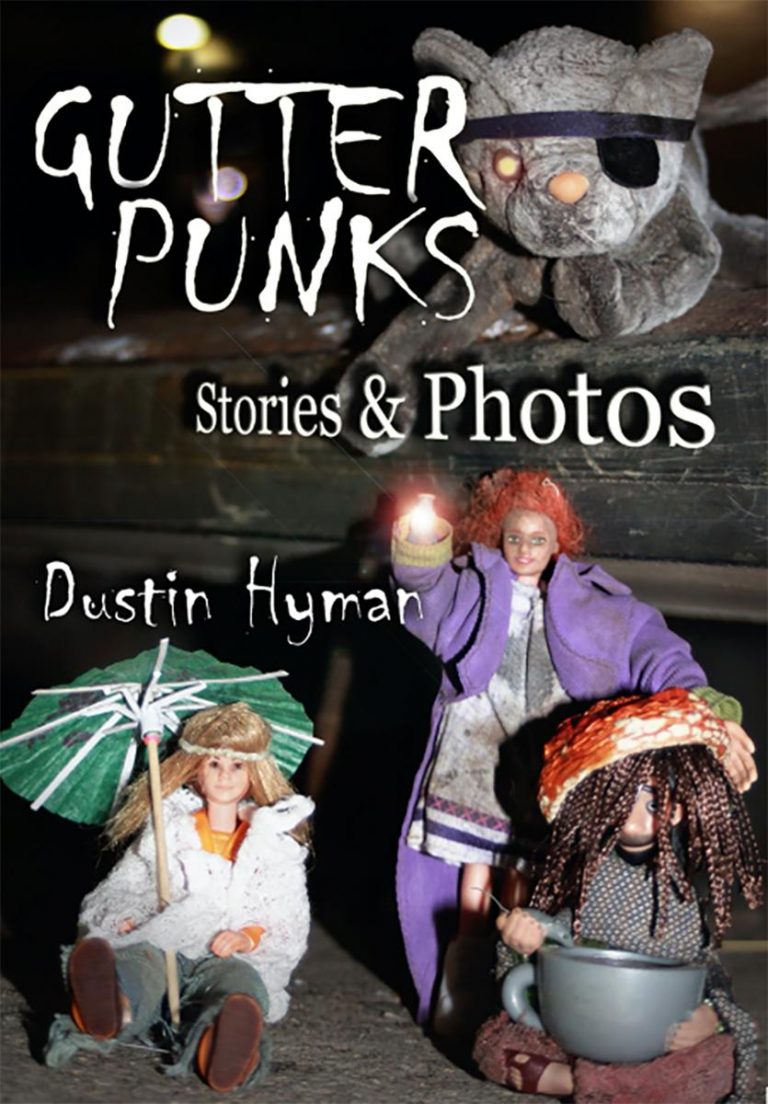T’Naus Nieto
The Chronicle-News
In 2006, Dustin Hyman was in jail, reflecting on his life and decisions. Growing up in the small town of Atascadero, California, he struggled academically and was a self-proclaimed class clown who had difficulties reading and writing due to dyslexia. When his dad visited him behind bars, Hyman approached him in an orange jumpsuit, and the look on his father’s face inspired a turning point.
Since then, Hyman went back to college, got his doctorate at the University of Louisiana, published over a dozen short stories in literary presses and magazines, released a novella called “Island Folks,” won the prestigious and celebrated Nelson Algren Literary Award, became a college professor at Trinidad State College, and is now releasing a new book, “Gutter Punks.”
Hyman’s new book is a collection of short stories that leaves readers immersed in gritty, grimy, and bizarre places with plenty of self-reflection, entertaining social commentary, and laughter. Stories range from magical realism, sci-fi, fantasy, and mixes dark concepts with humor. However, getting the book published through Gateway Literary Press, was no easy task. The literary journal has a ‘sizable’ backlog, only publishes around two to three books yearly, and is highly selective.
Publisher Joe Baumann, who has a doctorate in English, spoke about the selection of Hyman’s work. “I was struck right away…He has a fantastic economy of language. His stories are efficient, fast-paced, weird, and funny. He wasn’t afraid to come up with awkward, gritty, and unpleasant people. But the writing about them was never unpleasant to read. And that struck me when I read his work out of our pile of submissions. It was exactly the offbeat, weird, fun but still had a lot of depth to it kind of work we were after… We’re excited to publish [his book] and happy it’s getting out into the world.”
Hyman talked about the moment that changed his life in jail. “My dad was a county director of drug and alcohol services. He was a very sober but loving man. When he came to visit me, I was worried he’d be pissed. And when I saw him, there was no anger. He was just worried. And that hit me real hard.”
Hyman had a dilemma. He wanted to return to school but understood he wasn’t a good student. He said, “I was never good at school because of my dyslexia. I struggled with grades. Reading and writing never came easy for me. But there were two classes I really liked. One was creative writing, and I remember the teacher complimented me. He told me, ‘This is pretty good. You should enter it into a competition.’ Years later, when I was in jail, I realized that meant he really liked what I did. No other teacher ever gave me a compliment like that.”
“The other class was called narrative script writing… I got to tell a story for the first time. And that was the goal, to make an entertaining story, and for me, that was fun and freeing. I thought, okay, I’m going to go back to school and try to be a writer. And I’ve been trying to do that ever since.”
Hyman had set his sights on becoming a writer and was determined to achieve his goals. However, his dreams seemed impossible at one point, and he almost gave up just before completing his doctorate. Nevertheless, he submitted his short story, “Church of Pit,” to the Chicago Tribune, not expecting much from it. To his surprise, he won the 2018 Nelson Algren Literary Award, beating out more than 4,000 other contenders. This recognition confirmed his belief in his talent and motivated him to continue.
Hyman said, “I got the call from the Chicago Tribune during my yard sale. I was drinking a PBR in a lawn chair, selling all my stuff, and moving from Lafayette, Louisiana, back to California. I needed to find work. At that point, making a livable wage from creative writing seemed impossible. It’s still a pipe dream. But winning that award validated my efforts, and I decided to keep writing.”
“The Church of Pit,” the award winning short story, appears in the book.
College professor at Winthrop University and childhood friend Dr. Ephraim Sommers uses some of Hyman’s writing to teach his classes. While referring to the story “Church of Pit,” he said, “He (Hyman) uses the spectacle of the pit (in the story) to critique the way people deal with things they don’t understand…although it serves as an allegory for more significant social issues they’re not at the forefront. A good story that’s entertaining you or making you laugh is at the forefront, and those other things are buried a bit deeper.”
Sommers said, “What I love about Dustin’s writing is this thoughtful, sort of cutting humor. I haven’t found enough fiction books that can poke fun at society and make us look in a mirror. I think it softens the critique by allowing us to laugh at each other and ourselves.”
Hyman’s writing uniquely merges dark and gritty elements and characters with depth, social commentary on capitalism and classism, and a lot of humor.
When asked where he gets his inspiration, Hyman said, “Well, I’m an observer. I don’t like big crowds, but I like to watch people from the outside looking in. Often, they provide ideas and stories. I especially like characters living on the edge: poor people, drug dealers, and drug addicts. I kind of ran with a seedy crowd for a while. And we can learn a lot from struggling people. Not everyone is a criminal in these stories. But almost everyone in these stories has a job they can’t stand. And I’ve had a lot of those over the years.”
When asked where his literary comedic chops originated, Hyman said, “I grew up as the youngest of four siblings. Comedy was probably a defense mechanism…I almost got [voted] class clown in high school. I was runner-up to Matt Jorgenson. I still feel I deserved to have won that award, but it was a long time ago. Congratulations, Matt, wherever you are.”
“I’ve been reading books by standup comedians and watching specials. They often point out things that writers try to point out, too. These are things that people notice but might not articulate or be scared to share. I’m trying to do the same thing but in short story form…But I think [these stories] need it because there’s some darkness to these.”
Stand up comedian Nathan Lund gave a quote for the book that said, “Some of these stories could be your life, unless you’re a total square.”
Hyman also draws inspiration for his stories from his small-town upbringing and how it shaped his perception.
Baumann said, “Many of his stories are about small rural towns…. They look at small-town life, the reality… and that these are the kinds of people that you may encounter. But he also treats them with a great deal of humanity and respect. He’s very good at capturing both angles. There is thoughtful consideration of what it’s like to be from a rural place. He doesn’t ever punch down but captures the experience of rural living in a way that feels very authentic without being insulting.”
Hyman said, “I grew up in a small town, the demographic pretty much middle class to poor. My parents and my friend’s parents were all pretty much blue-collar. There are a lot of people in small towns in these stories… You’ll recognize people struggling to earn a living in different capacities. You’ll see people that are doing drugs, selling drugs, trying to cope with it. Alcoholics, violence. So, in a lot of ways, every small town in America has a drug problem. Every small town in America has people with depression trying to get by. Every small town like Trinidad has people who don’t want to show up to work but do what they have to do to support their families and do enough to get by. And in that way, I think it relates…I think people should identify with these characters because gutter punks are in every small town.”
“Gutter Punks” by Dustin Hyman was officially published on Jan. 31, 2024, and is available on Gateway Literary Press’s website.




